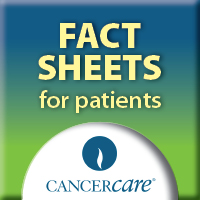After you receive a breast cancer diagnosis, your doctor will order various diagnostic tests that provide important details about your type and stage of breast cancer. The results of these tests help guide his or her treatment recommendations. If you have early-stage breast cancer, you may also be a candidate for newer tests that can estimate your risk of recurrence and/or predict how likely it is that you will benefit from the hormonal therapy tamoxifen.
The following are questions you may want to ask your doctor about the results of your diagnostic tests:
Is my tumor invasive or noninvasive? Invasive breast tumors have started growing into nearby healthy breast tissues. Noninvasive or in situ tumors are confined to the milk ducts; this is the earliest stage of breast cancer. As is true for most cancers, breast cancer in the earliest stage usually has the best chance of being cured.
What stage is my tumor? A tumor’s stage refers to its size and extent of spread in the body – e.g., whether it has spread to lymph nodes or other organs. Cancer confined to the breast may be called localized cancer. Cancer that has spread to other organs is called metastatic cancer. A cancer’s stage is often denoted by a Roman numeral (I, II, III or IV). The higher the numeral, the more the cancer has spread within the body.
What grade is my tumor? A tumor’s grade refers to how the tumor cells look under a microscope. The more different they look from healthy cells, the higher the grade and the more quickly the cancer is likely to grow.
What is my hormone receptor status? Some breast tumors are stimulated to grow by the hormone estrogen. Tumors take in estrogen via structures on tumor cell surfaces called estrogen or progesterone receptors. Tumor cells with many of these receptors on their surfaces are said to be estrogen or progesterone receptor positive. These tumors are often successfully treated with hormonal therapy (e.g., tamoxifen and aromatase inhibitors).
What is my HER2/neu status? HER2/neu is a substance that is overproduced by about 25% of breast tumors. Tumors that overproduce HER2/neu are called HER2 positive and may respond to treatment with drugs like trastuzumab (Herceptin) which target HER2/neu.
How likely is my cancer to spread or to come back? To estimate the likelihood that the cancer will spread or come back (recur), doctors usually look at tumor features such as size, stage and grade, as well as hormone receptor and HER2/neu status. Today, there are also new tests that can estimate risk of recurrence for women with early-stage breast cancer. Such “prognostic tests” are performed on samples of tumor tissue removed during surgery. They analyze the activity of various genes to predict how the tumor will behave – that is, whether it is likely to come back or spread. Two tests now on the market, Oncotype DX and MammaPrint, can estimate the risk that certain early-stage breast tumors will recur.
Is a prognostic test right for me? Currently, there are only two such tests approved, and each is appropriate only for women with a specific type of early-stage breast cancer. Oncotype DX is approved for use in women with recently diagnosed stage I or II, node-negative (has not spread to the lymph nodes), hormone receptor positive breast cancer, who are or will be receiving hormonal therapy. MammaPrint is approved for patients aged 61 or younger with stage I or II breast cancer that is node-negative, whose tumors are less than five centimeters (two inches) in diameter. Your doctor can give you more information about whether one of these tests may be a good option for you.
What can a prognostic test tell me about my chance of recurrence? Tests like Oncotype DX and MammaPrint tests cannot say with certainty whether your cancer will come back or not. They can measure, for example, whether the risk of your cancer coming back is low, intermediate or high. The test results may provide additional information to help you and your doctor decide on the best way to treat your cancer.
Will I need to have chemotherapy? If you are diagnosed with early-stage breast cancer, chemotherapy could reduce the risk that your cancer will come back, but it may also cause long-lasting side effects. In addition to estimating risk of recurrence, Oncotype DX identifies patients who may be successfully treated with tamoxifen alone and may not need chemotherapy. Oncotype DX is the only such test currently on the market, but more may be available in the future. Check with your doctor about whether this type of test might be right for you.
For more information, see the ASCO Patient Guide “Tumor Markers for BreastCancers” on www.cancer.net.
 |
